Report on Global Business Environment Factors Impacting Tufwell Glass
VerifiedAdded on 2021/01/19
|17
|4726
|41
Report
AI Summary
This report provides a comprehensive analysis of the global business environment, focusing on the case of Tufwell Glass. It begins by defining globalization and identifying key factors driving global commerce, including the business environment, competition, cost, and market dynamics. The report then delves into a PESTLE analysis, examining the political, economic, social, technological, environmental, and legal factors influencing Tufwell Glass. Furthermore, the report explores the strategic challenges faced by the company in the global environment, such as international trade law, digital design, and risk diversification. Finally, the report assesses the impact of globalization on Tufwell Glass's structure, culture, and functions, employing the McKinsey 7S model to analyze the company's strategy, structure, systems, shared values, skills, style, and staff. The analysis provides a detailed understanding of the complexities of operating in a globalized market.

Global Business Environment
Paraphrase This Document
Need a fresh take? Get an instant paraphrase of this document with our AI Paraphraser
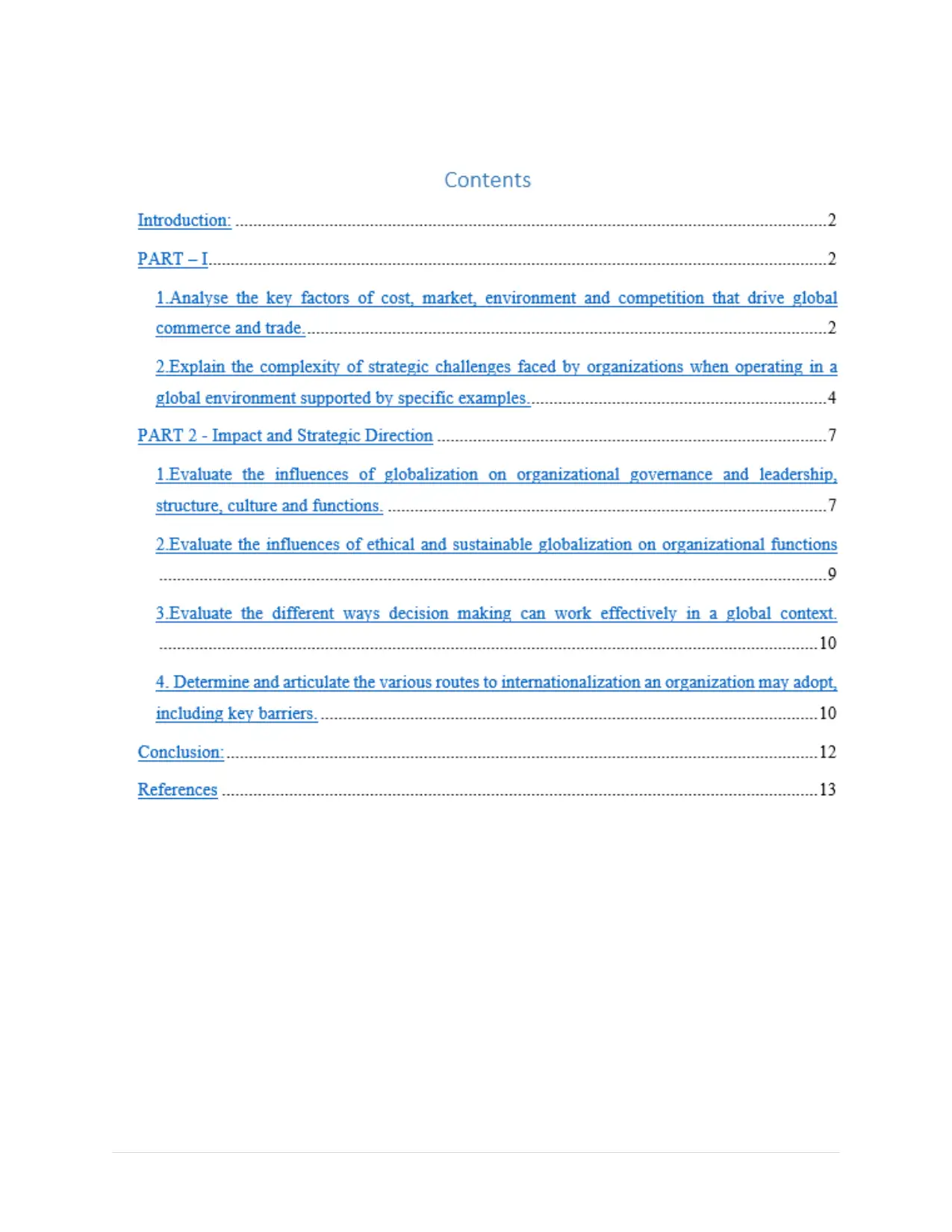
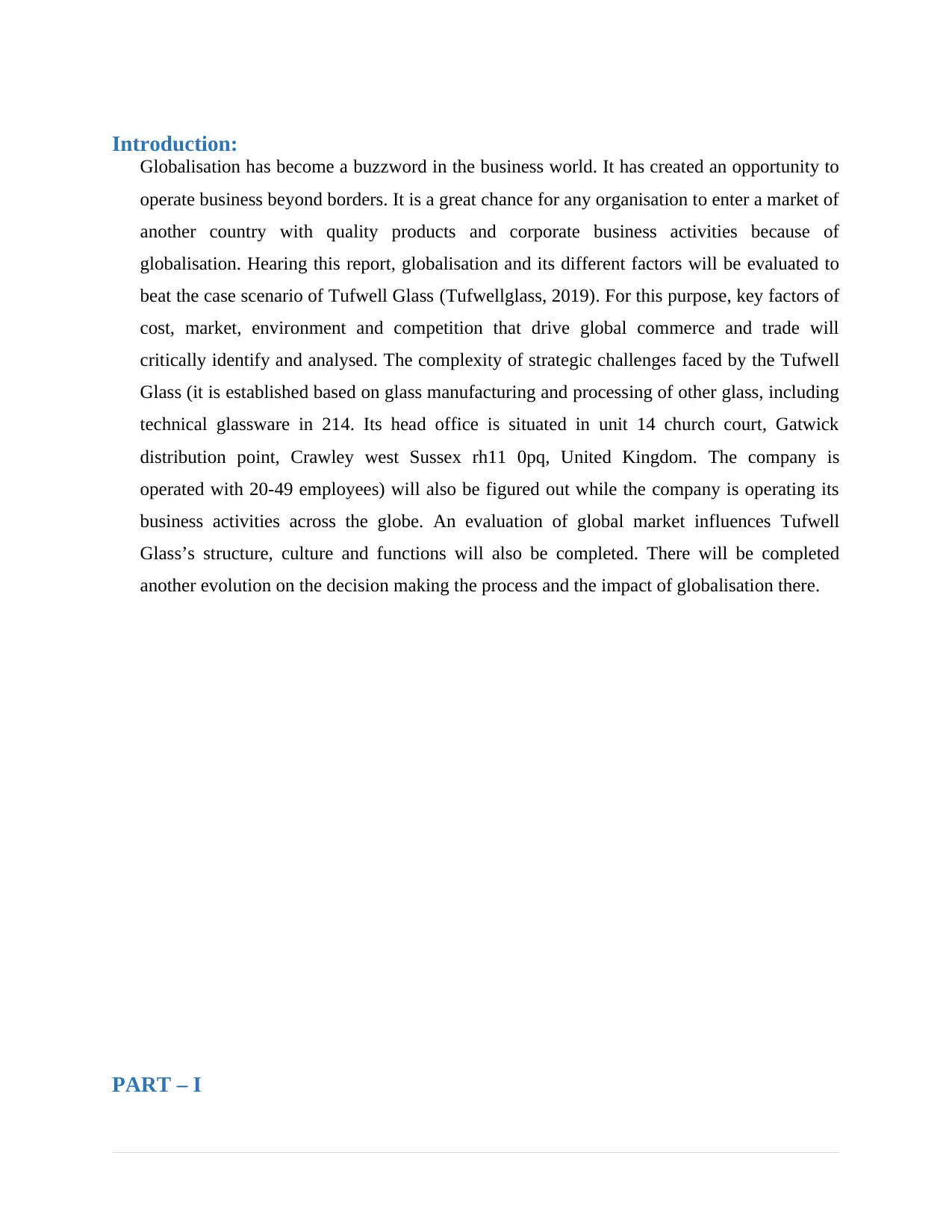
Introduction:
Globalisation has become a buzzword in the business world. It has created an opportunity to
operate business beyond borders. It is a great chance for any organisation to enter a market of
another country with quality products and corporate business activities because of
globalisation. Hearing this report, globalisation and its different factors will be evaluated to
beat the case scenario of Tufwell Glass (Tufwellglass, 2019). For this purpose, key factors of
cost, market, environment and competition that drive global commerce and trade will
critically identify and analysed. The complexity of strategic challenges faced by the Tufwell
Glass (it is established based on glass manufacturing and processing of other glass, including
technical glassware in 214. Its head office is situated in unit 14 church court, Gatwick
distribution point, Crawley west Sussex rh11 0pq, United Kingdom. The company is
operated with 20-49 employees) will also be figured out while the company is operating its
business activities across the globe. An evaluation of global market influences Tufwell
Glass’s structure, culture and functions will also be completed. There will be completed
another evolution on the decision making the process and the impact of globalisation there.
PART – I
Globalisation has become a buzzword in the business world. It has created an opportunity to
operate business beyond borders. It is a great chance for any organisation to enter a market of
another country with quality products and corporate business activities because of
globalisation. Hearing this report, globalisation and its different factors will be evaluated to
beat the case scenario of Tufwell Glass (Tufwellglass, 2019). For this purpose, key factors of
cost, market, environment and competition that drive global commerce and trade will
critically identify and analysed. The complexity of strategic challenges faced by the Tufwell
Glass (it is established based on glass manufacturing and processing of other glass, including
technical glassware in 214. Its head office is situated in unit 14 church court, Gatwick
distribution point, Crawley west Sussex rh11 0pq, United Kingdom. The company is
operated with 20-49 employees) will also be figured out while the company is operating its
business activities across the globe. An evaluation of global market influences Tufwell
Glass’s structure, culture and functions will also be completed. There will be completed
another evolution on the decision making the process and the impact of globalisation there.
PART – I
⊘ This is a preview!⊘
Do you want full access?
Subscribe today to unlock all pages.

Trusted by 1+ million students worldwide
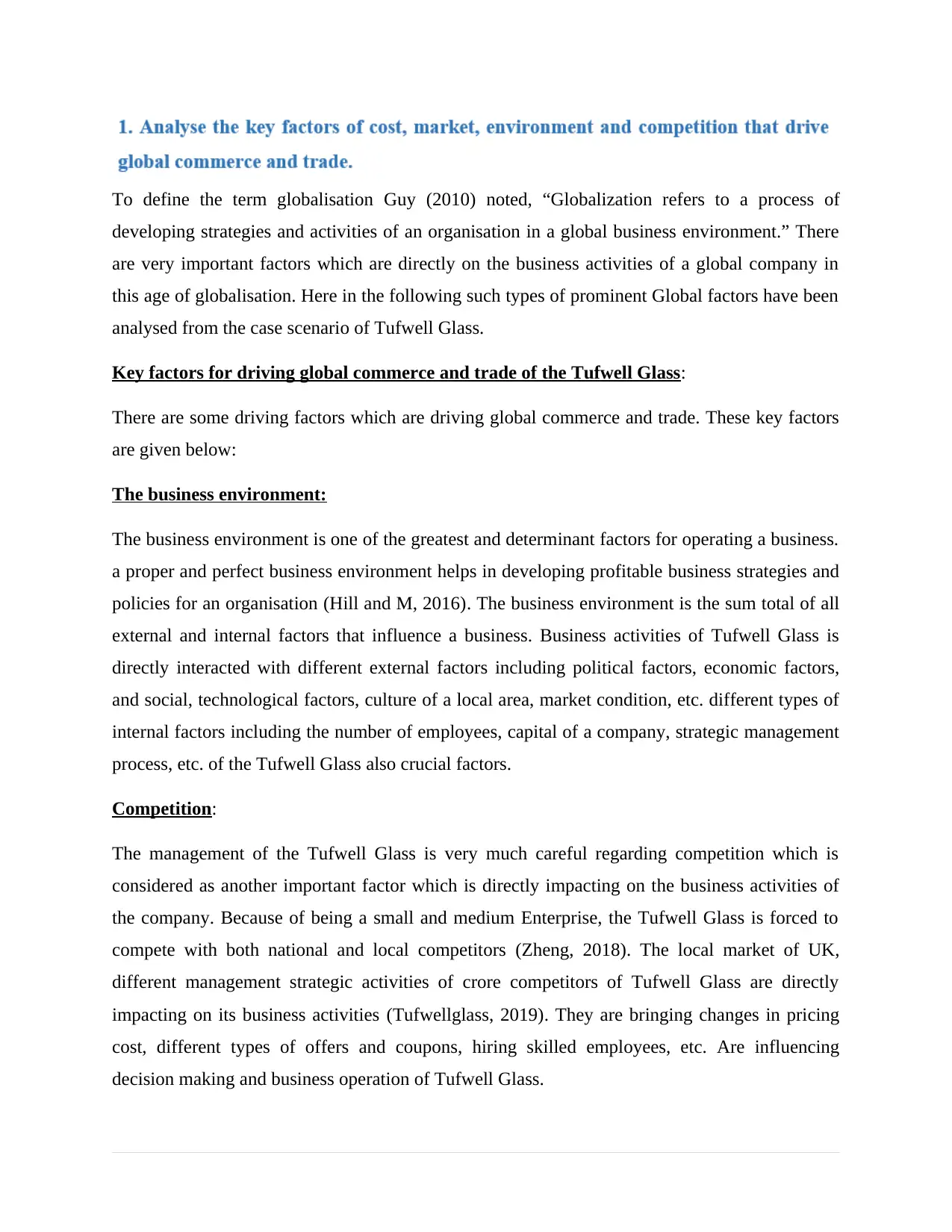
To define the term globalisation Guy (2010) noted, “Globalization refers to a process of
developing strategies and activities of an organisation in a global business environment.” There
are very important factors which are directly on the business activities of a global company in
this age of globalisation. Here in the following such types of prominent Global factors have been
analysed from the case scenario of Tufwell Glass.
Key factors for driving global commerce and trade of the Tufwell Glass:
There are some driving factors which are driving global commerce and trade. These key factors
are given below:
The business environment:
The business environment is one of the greatest and determinant factors for operating a business.
a proper and perfect business environment helps in developing profitable business strategies and
policies for an organisation (Hill and M, 2016). The business environment is the sum total of all
external and internal factors that influence a business. Business activities of Tufwell Glass is
directly interacted with different external factors including political factors, economic factors,
and social, technological factors, culture of a local area, market condition, etc. different types of
internal factors including the number of employees, capital of a company, strategic management
process, etc. of the Tufwell Glass also crucial factors.
Competition:
The management of the Tufwell Glass is very much careful regarding competition which is
considered as another important factor which is directly impacting on the business activities of
the company. Because of being a small and medium Enterprise, the Tufwell Glass is forced to
compete with both national and local competitors (Zheng, 2018). The local market of UK,
different management strategic activities of crore competitors of Tufwell Glass are directly
impacting on its business activities (Tufwellglass, 2019). They are bringing changes in pricing
cost, different types of offers and coupons, hiring skilled employees, etc. Are influencing
decision making and business operation of Tufwell Glass.
developing strategies and activities of an organisation in a global business environment.” There
are very important factors which are directly on the business activities of a global company in
this age of globalisation. Here in the following such types of prominent Global factors have been
analysed from the case scenario of Tufwell Glass.
Key factors for driving global commerce and trade of the Tufwell Glass:
There are some driving factors which are driving global commerce and trade. These key factors
are given below:
The business environment:
The business environment is one of the greatest and determinant factors for operating a business.
a proper and perfect business environment helps in developing profitable business strategies and
policies for an organisation (Hill and M, 2016). The business environment is the sum total of all
external and internal factors that influence a business. Business activities of Tufwell Glass is
directly interacted with different external factors including political factors, economic factors,
and social, technological factors, culture of a local area, market condition, etc. different types of
internal factors including the number of employees, capital of a company, strategic management
process, etc. of the Tufwell Glass also crucial factors.
Competition:
The management of the Tufwell Glass is very much careful regarding competition which is
considered as another important factor which is directly impacting on the business activities of
the company. Because of being a small and medium Enterprise, the Tufwell Glass is forced to
compete with both national and local competitors (Zheng, 2018). The local market of UK,
different management strategic activities of crore competitors of Tufwell Glass are directly
impacting on its business activities (Tufwellglass, 2019). They are bringing changes in pricing
cost, different types of offers and coupons, hiring skilled employees, etc. Are influencing
decision making and business operation of Tufwell Glass.
Paraphrase This Document
Need a fresh take? Get an instant paraphrase of this document with our AI Paraphraser
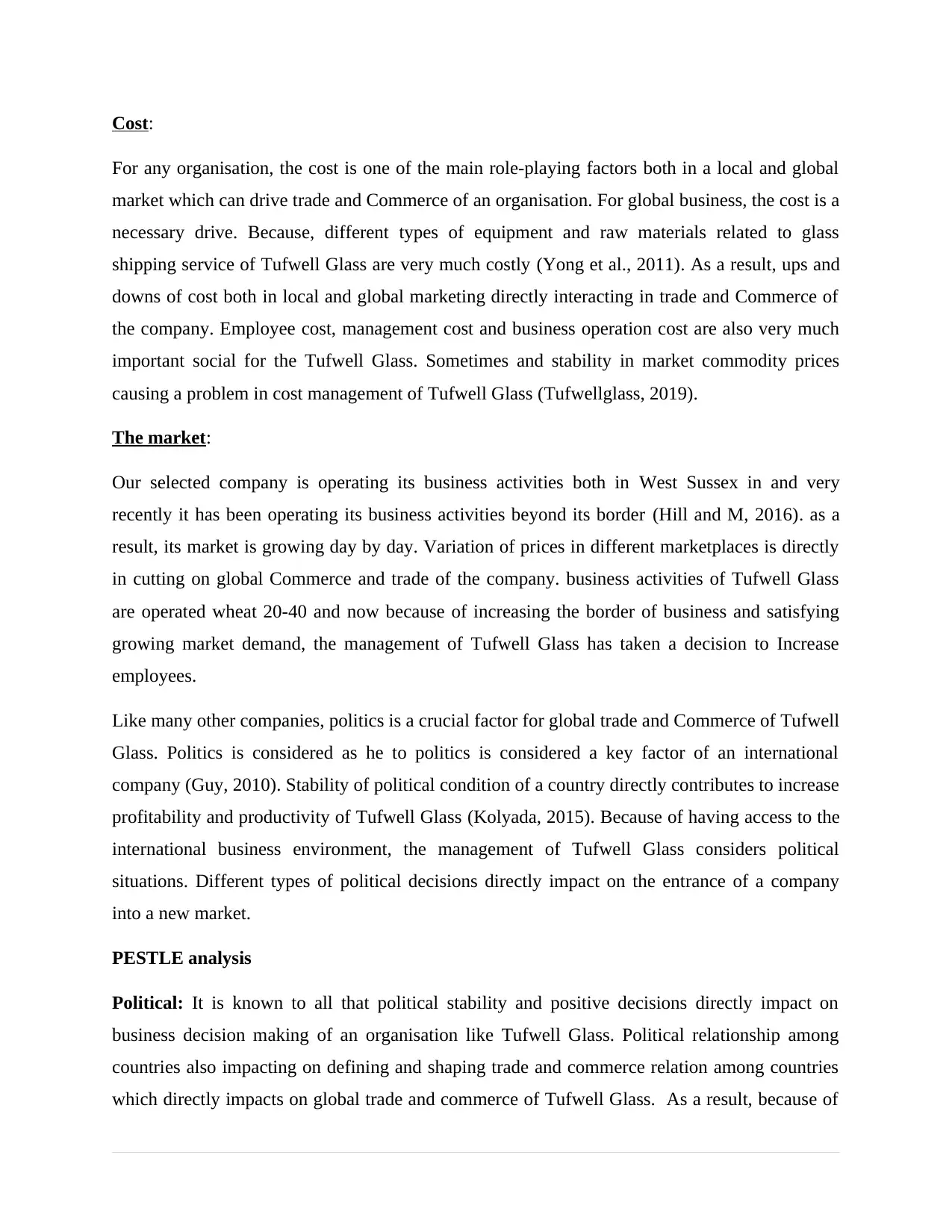
Cost:
For any organisation, the cost is one of the main role-playing factors both in a local and global
market which can drive trade and Commerce of an organisation. For global business, the cost is a
necessary drive. Because, different types of equipment and raw materials related to glass
shipping service of Tufwell Glass are very much costly (Yong et al., 2011). As a result, ups and
downs of cost both in local and global marketing directly interacting in trade and Commerce of
the company. Employee cost, management cost and business operation cost are also very much
important social for the Tufwell Glass. Sometimes and stability in market commodity prices
causing a problem in cost management of Tufwell Glass (Tufwellglass, 2019).
The market:
Our selected company is operating its business activities both in West Sussex in and very
recently it has been operating its business activities beyond its border (Hill and M, 2016). as a
result, its market is growing day by day. Variation of prices in different marketplaces is directly
in cutting on global Commerce and trade of the company. business activities of Tufwell Glass
are operated wheat 20-40 and now because of increasing the border of business and satisfying
growing market demand, the management of Tufwell Glass has taken a decision to Increase
employees.
Like many other companies, politics is a crucial factor for global trade and Commerce of Tufwell
Glass. Politics is considered as he to politics is considered a key factor of an international
company (Guy, 2010). Stability of political condition of a country directly contributes to increase
profitability and productivity of Tufwell Glass (Kolyada, 2015). Because of having access to the
international business environment, the management of Tufwell Glass considers political
situations. Different types of political decisions directly impact on the entrance of a company
into a new market.
PESTLE analysis
Political: It is known to all that political stability and positive decisions directly impact on
business decision making of an organisation like Tufwell Glass. Political relationship among
countries also impacting on defining and shaping trade and commerce relation among countries
which directly impacts on global trade and commerce of Tufwell Glass. As a result, because of
For any organisation, the cost is one of the main role-playing factors both in a local and global
market which can drive trade and Commerce of an organisation. For global business, the cost is a
necessary drive. Because, different types of equipment and raw materials related to glass
shipping service of Tufwell Glass are very much costly (Yong et al., 2011). As a result, ups and
downs of cost both in local and global marketing directly interacting in trade and Commerce of
the company. Employee cost, management cost and business operation cost are also very much
important social for the Tufwell Glass. Sometimes and stability in market commodity prices
causing a problem in cost management of Tufwell Glass (Tufwellglass, 2019).
The market:
Our selected company is operating its business activities both in West Sussex in and very
recently it has been operating its business activities beyond its border (Hill and M, 2016). as a
result, its market is growing day by day. Variation of prices in different marketplaces is directly
in cutting on global Commerce and trade of the company. business activities of Tufwell Glass
are operated wheat 20-40 and now because of increasing the border of business and satisfying
growing market demand, the management of Tufwell Glass has taken a decision to Increase
employees.
Like many other companies, politics is a crucial factor for global trade and Commerce of Tufwell
Glass. Politics is considered as he to politics is considered a key factor of an international
company (Guy, 2010). Stability of political condition of a country directly contributes to increase
profitability and productivity of Tufwell Glass (Kolyada, 2015). Because of having access to the
international business environment, the management of Tufwell Glass considers political
situations. Different types of political decisions directly impact on the entrance of a company
into a new market.
PESTLE analysis
Political: It is known to all that political stability and positive decisions directly impact on
business decision making of an organisation like Tufwell Glass. Political relationship among
countries also impacting on defining and shaping trade and commerce relation among countries
which directly impacts on global trade and commerce of Tufwell Glass. As a result, because of
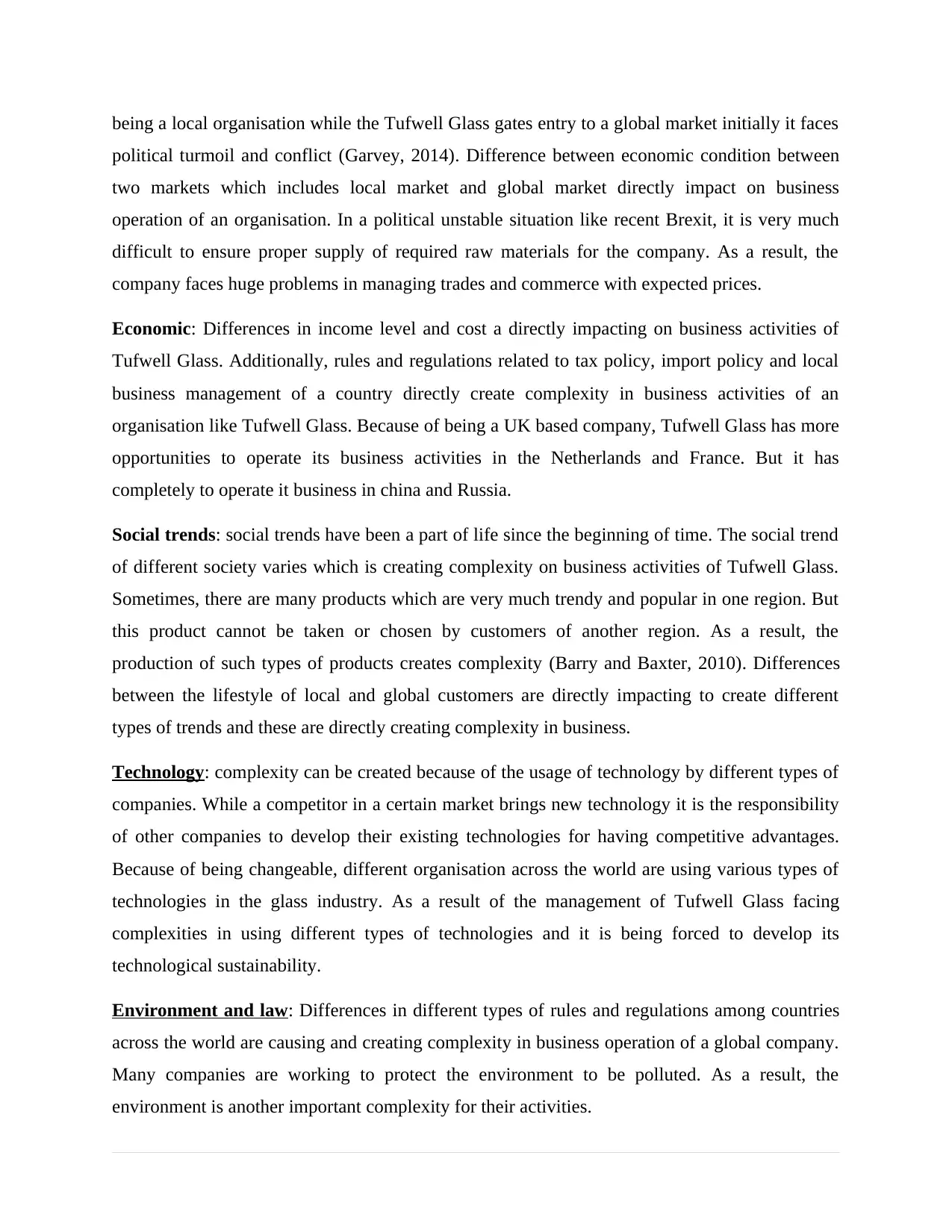
being a local organisation while the Tufwell Glass gates entry to a global market initially it faces
political turmoil and conflict (Garvey, 2014). Difference between economic condition between
two markets which includes local market and global market directly impact on business
operation of an organisation. In a political unstable situation like recent Brexit, it is very much
difficult to ensure proper supply of required raw materials for the company. As a result, the
company faces huge problems in managing trades and commerce with expected prices.
Economic: Differences in income level and cost a directly impacting on business activities of
Tufwell Glass. Additionally, rules and regulations related to tax policy, import policy and local
business management of a country directly create complexity in business activities of an
organisation like Tufwell Glass. Because of being a UK based company, Tufwell Glass has more
opportunities to operate its business activities in the Netherlands and France. But it has
completely to operate it business in china and Russia.
Social trends: social trends have been a part of life since the beginning of time. The social trend
of different society varies which is creating complexity on business activities of Tufwell Glass.
Sometimes, there are many products which are very much trendy and popular in one region. But
this product cannot be taken or chosen by customers of another region. As a result, the
production of such types of products creates complexity (Barry and Baxter, 2010). Differences
between the lifestyle of local and global customers are directly impacting to create different
types of trends and these are directly creating complexity in business.
Technology: complexity can be created because of the usage of technology by different types of
companies. While a competitor in a certain market brings new technology it is the responsibility
of other companies to develop their existing technologies for having competitive advantages.
Because of being changeable, different organisation across the world are using various types of
technologies in the glass industry. As a result of the management of Tufwell Glass facing
complexities in using different types of technologies and it is being forced to develop its
technological sustainability.
Environment and law: Differences in different types of rules and regulations among countries
across the world are causing and creating complexity in business operation of a global company.
Many companies are working to protect the environment to be polluted. As a result, the
environment is another important complexity for their activities.
political turmoil and conflict (Garvey, 2014). Difference between economic condition between
two markets which includes local market and global market directly impact on business
operation of an organisation. In a political unstable situation like recent Brexit, it is very much
difficult to ensure proper supply of required raw materials for the company. As a result, the
company faces huge problems in managing trades and commerce with expected prices.
Economic: Differences in income level and cost a directly impacting on business activities of
Tufwell Glass. Additionally, rules and regulations related to tax policy, import policy and local
business management of a country directly create complexity in business activities of an
organisation like Tufwell Glass. Because of being a UK based company, Tufwell Glass has more
opportunities to operate its business activities in the Netherlands and France. But it has
completely to operate it business in china and Russia.
Social trends: social trends have been a part of life since the beginning of time. The social trend
of different society varies which is creating complexity on business activities of Tufwell Glass.
Sometimes, there are many products which are very much trendy and popular in one region. But
this product cannot be taken or chosen by customers of another region. As a result, the
production of such types of products creates complexity (Barry and Baxter, 2010). Differences
between the lifestyle of local and global customers are directly impacting to create different
types of trends and these are directly creating complexity in business.
Technology: complexity can be created because of the usage of technology by different types of
companies. While a competitor in a certain market brings new technology it is the responsibility
of other companies to develop their existing technologies for having competitive advantages.
Because of being changeable, different organisation across the world are using various types of
technologies in the glass industry. As a result of the management of Tufwell Glass facing
complexities in using different types of technologies and it is being forced to develop its
technological sustainability.
Environment and law: Differences in different types of rules and regulations among countries
across the world are causing and creating complexity in business operation of a global company.
Many companies are working to protect the environment to be polluted. As a result, the
environment is another important complexity for their activities.
⊘ This is a preview!⊘
Do you want full access?
Subscribe today to unlock all pages.

Trusted by 1+ million students worldwide
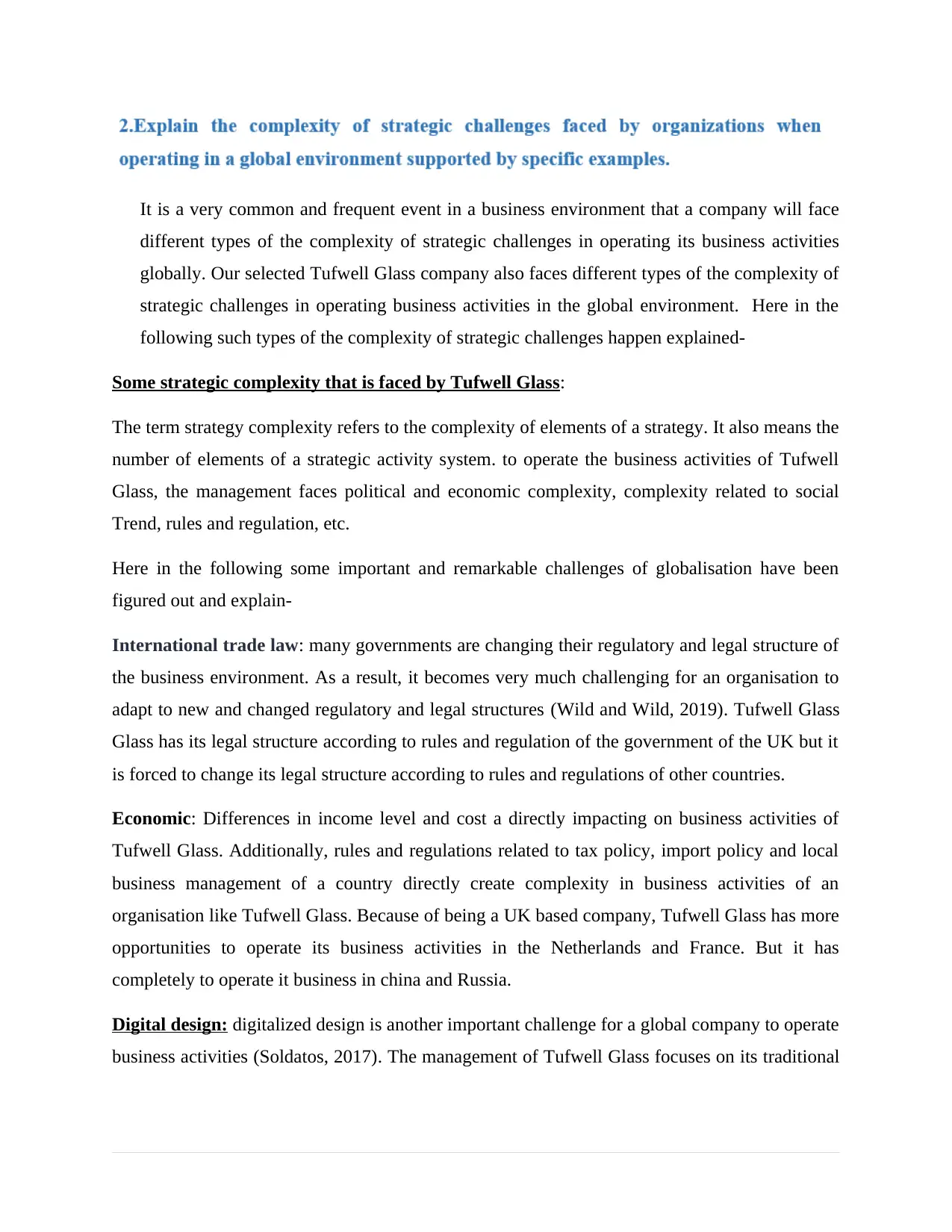
It is a very common and frequent event in a business environment that a company will face
different types of the complexity of strategic challenges in operating its business activities
globally. Our selected Tufwell Glass company also faces different types of the complexity of
strategic challenges in operating business activities in the global environment. Here in the
following such types of the complexity of strategic challenges happen explained-
Some strategic complexity that is faced by Tufwell Glass:
The term strategy complexity refers to the complexity of elements of a strategy. It also means the
number of elements of a strategic activity system. to operate the business activities of Tufwell
Glass, the management faces political and economic complexity, complexity related to social
Trend, rules and regulation, etc.
Here in the following some important and remarkable challenges of globalisation have been
figured out and explain-
International trade law: many governments are changing their regulatory and legal structure of
the business environment. As a result, it becomes very much challenging for an organisation to
adapt to new and changed regulatory and legal structures (Wild and Wild, 2019). Tufwell Glass
Glass has its legal structure according to rules and regulation of the government of the UK but it
is forced to change its legal structure according to rules and regulations of other countries.
Economic: Differences in income level and cost a directly impacting on business activities of
Tufwell Glass. Additionally, rules and regulations related to tax policy, import policy and local
business management of a country directly create complexity in business activities of an
organisation like Tufwell Glass. Because of being a UK based company, Tufwell Glass has more
opportunities to operate its business activities in the Netherlands and France. But it has
completely to operate it business in china and Russia.
Digital design: digitalized design is another important challenge for a global company to operate
business activities (Soldatos, 2017). The management of Tufwell Glass focuses on its traditional
different types of the complexity of strategic challenges in operating its business activities
globally. Our selected Tufwell Glass company also faces different types of the complexity of
strategic challenges in operating business activities in the global environment. Here in the
following such types of the complexity of strategic challenges happen explained-
Some strategic complexity that is faced by Tufwell Glass:
The term strategy complexity refers to the complexity of elements of a strategy. It also means the
number of elements of a strategic activity system. to operate the business activities of Tufwell
Glass, the management faces political and economic complexity, complexity related to social
Trend, rules and regulation, etc.
Here in the following some important and remarkable challenges of globalisation have been
figured out and explain-
International trade law: many governments are changing their regulatory and legal structure of
the business environment. As a result, it becomes very much challenging for an organisation to
adapt to new and changed regulatory and legal structures (Wild and Wild, 2019). Tufwell Glass
Glass has its legal structure according to rules and regulation of the government of the UK but it
is forced to change its legal structure according to rules and regulations of other countries.
Economic: Differences in income level and cost a directly impacting on business activities of
Tufwell Glass. Additionally, rules and regulations related to tax policy, import policy and local
business management of a country directly create complexity in business activities of an
organisation like Tufwell Glass. Because of being a UK based company, Tufwell Glass has more
opportunities to operate its business activities in the Netherlands and France. But it has
completely to operate it business in china and Russia.
Digital design: digitalized design is another important challenge for a global company to operate
business activities (Soldatos, 2017). The management of Tufwell Glass focuses on its traditional
Paraphrase This Document
Need a fresh take? Get an instant paraphrase of this document with our AI Paraphraser
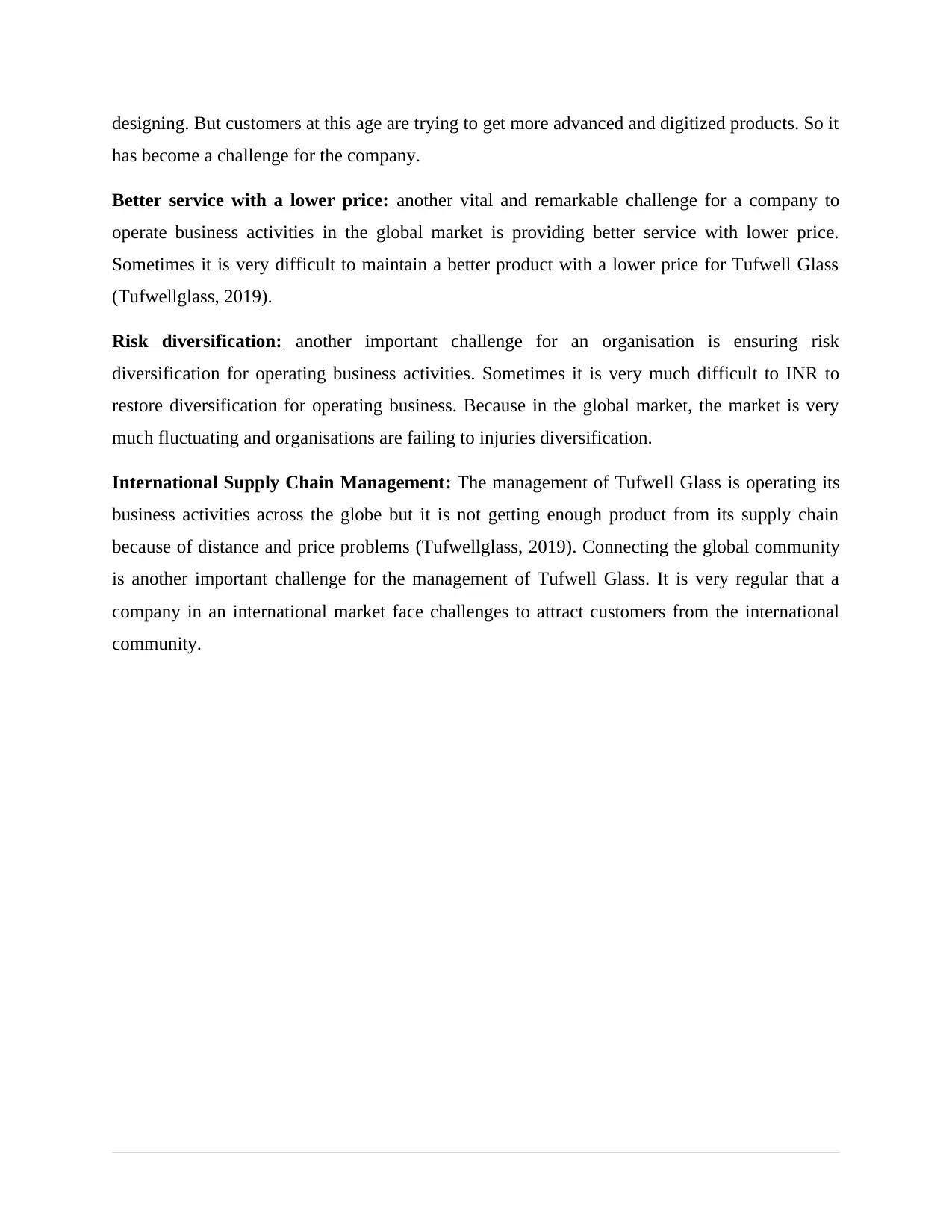
designing. But customers at this age are trying to get more advanced and digitized products. So it
has become a challenge for the company.
Better service with a lower price: another vital and remarkable challenge for a company to
operate business activities in the global market is providing better service with lower price.
Sometimes it is very difficult to maintain a better product with a lower price for Tufwell Glass
(Tufwellglass, 2019).
Risk diversification: another important challenge for an organisation is ensuring risk
diversification for operating business activities. Sometimes it is very much difficult to INR to
restore diversification for operating business. Because in the global market, the market is very
much fluctuating and organisations are failing to injuries diversification.
International Supply Chain Management: The management of Tufwell Glass is operating its
business activities across the globe but it is not getting enough product from its supply chain
because of distance and price problems (Tufwellglass, 2019). Connecting the global community
is another important challenge for the management of Tufwell Glass. It is very regular that a
company in an international market face challenges to attract customers from the international
community.
has become a challenge for the company.
Better service with a lower price: another vital and remarkable challenge for a company to
operate business activities in the global market is providing better service with lower price.
Sometimes it is very difficult to maintain a better product with a lower price for Tufwell Glass
(Tufwellglass, 2019).
Risk diversification: another important challenge for an organisation is ensuring risk
diversification for operating business activities. Sometimes it is very much difficult to INR to
restore diversification for operating business. Because in the global market, the market is very
much fluctuating and organisations are failing to injuries diversification.
International Supply Chain Management: The management of Tufwell Glass is operating its
business activities across the globe but it is not getting enough product from its supply chain
because of distance and price problems (Tufwellglass, 2019). Connecting the global community
is another important challenge for the management of Tufwell Glass. It is very regular that a
company in an international market face challenges to attract customers from the international
community.
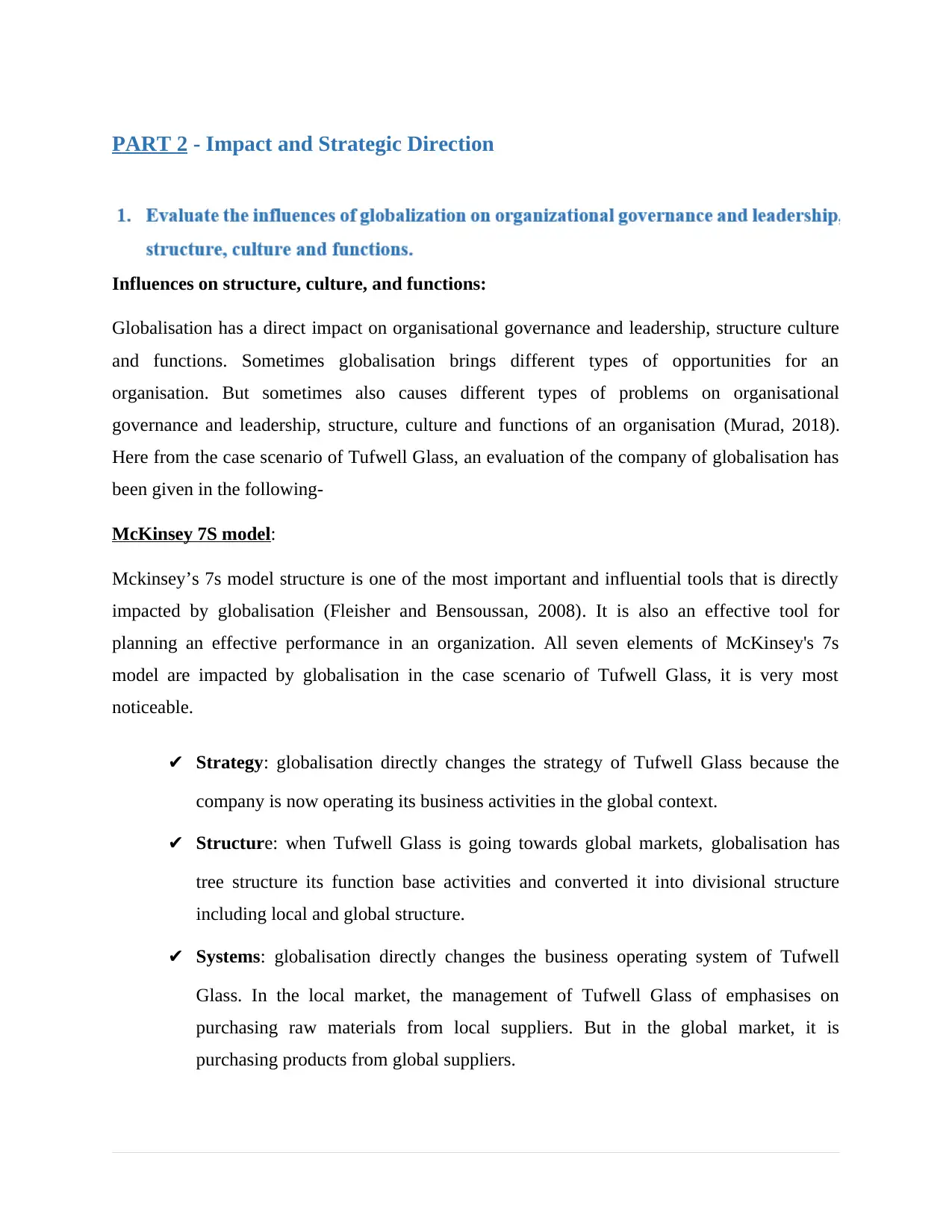
PART 2 - Impact and Strategic Direction
Influences on structure, culture, and functions:
Globalisation has a direct impact on organisational governance and leadership, structure culture
and functions. Sometimes globalisation brings different types of opportunities for an
organisation. But sometimes also causes different types of problems on organisational
governance and leadership, structure, culture and functions of an organisation (Murad, 2018).
Here from the case scenario of Tufwell Glass, an evaluation of the company of globalisation has
been given in the following-
McKinsey 7S model:
Mckinsey’s 7s model structure is one of the most important and influential tools that is directly
impacted by globalisation (Fleisher and Bensoussan, 2008). It is also an effective tool for
planning an effective performance in an organization. All seven elements of McKinsey's 7s
model are impacted by globalisation in the case scenario of Tufwell Glass, it is very most
noticeable.
✔ Strategy: globalisation directly changes the strategy of Tufwell Glass because the
company is now operating its business activities in the global context.
✔ Structure: when Tufwell Glass is going towards global markets, globalisation has
tree structure its function base activities and converted it into divisional structure
including local and global structure.
✔ Systems: globalisation directly changes the business operating system of Tufwell
Glass. In the local market, the management of Tufwell Glass of emphasises on
purchasing raw materials from local suppliers. But in the global market, it is
purchasing products from global suppliers.
Influences on structure, culture, and functions:
Globalisation has a direct impact on organisational governance and leadership, structure culture
and functions. Sometimes globalisation brings different types of opportunities for an
organisation. But sometimes also causes different types of problems on organisational
governance and leadership, structure, culture and functions of an organisation (Murad, 2018).
Here from the case scenario of Tufwell Glass, an evaluation of the company of globalisation has
been given in the following-
McKinsey 7S model:
Mckinsey’s 7s model structure is one of the most important and influential tools that is directly
impacted by globalisation (Fleisher and Bensoussan, 2008). It is also an effective tool for
planning an effective performance in an organization. All seven elements of McKinsey's 7s
model are impacted by globalisation in the case scenario of Tufwell Glass, it is very most
noticeable.
✔ Strategy: globalisation directly changes the strategy of Tufwell Glass because the
company is now operating its business activities in the global context.
✔ Structure: when Tufwell Glass is going towards global markets, globalisation has
tree structure its function base activities and converted it into divisional structure
including local and global structure.
✔ Systems: globalisation directly changes the business operating system of Tufwell
Glass. In the local market, the management of Tufwell Glass of emphasises on
purchasing raw materials from local suppliers. But in the global market, it is
purchasing products from global suppliers.
⊘ This is a preview!⊘
Do you want full access?
Subscribe today to unlock all pages.

Trusted by 1+ million students worldwide
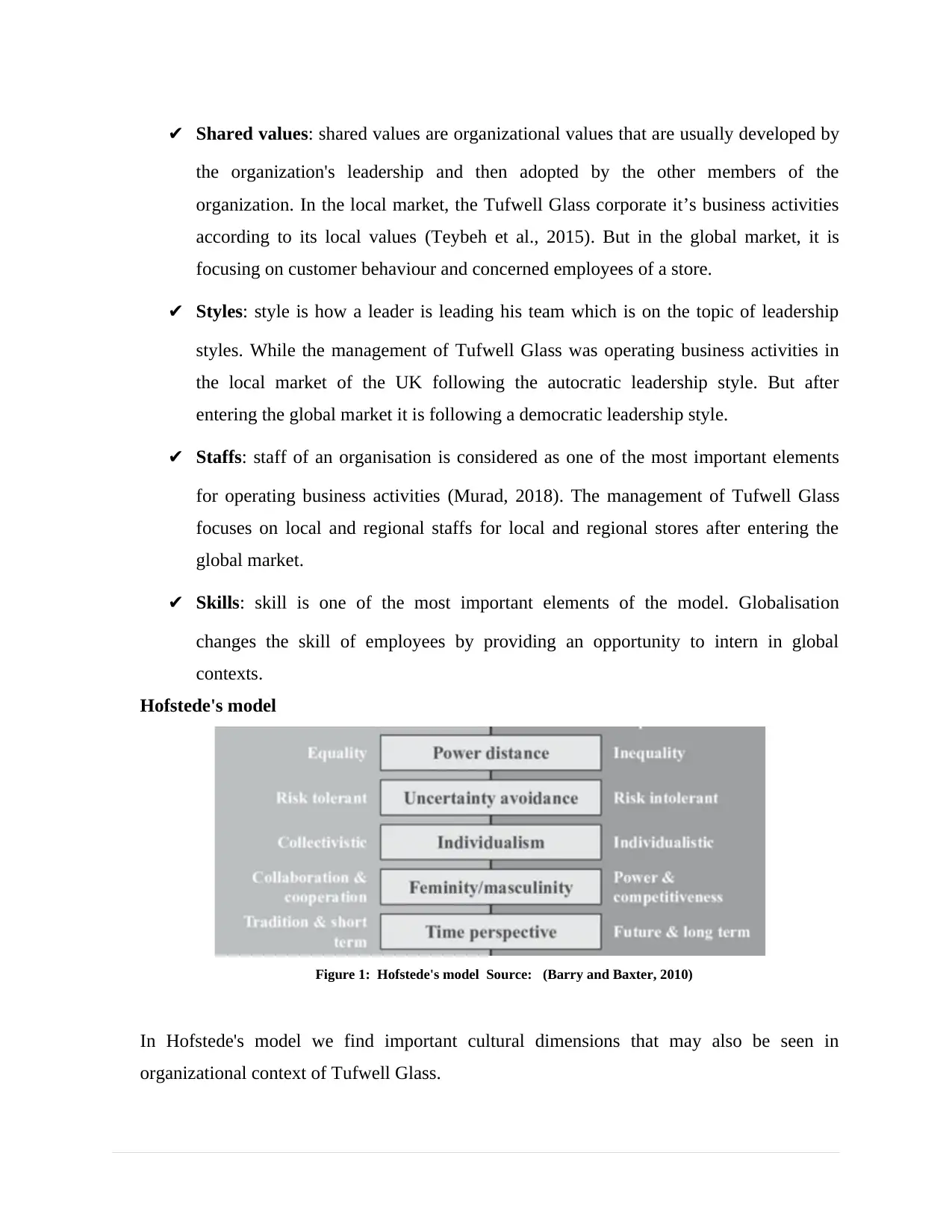
✔ Shared values: shared values are organizational values that are usually developed by
the organization's leadership and then adopted by the other members of the
organization. In the local market, the Tufwell Glass corporate it’s business activities
according to its local values (Teybeh et al., 2015). But in the global market, it is
focusing on customer behaviour and concerned employees of a store.
✔ Styles: style is how a leader is leading his team which is on the topic of leadership
styles. While the management of Tufwell Glass was operating business activities in
the local market of the UK following the autocratic leadership style. But after
entering the global market it is following a democratic leadership style.
✔ Staffs: staff of an organisation is considered as one of the most important elements
for operating business activities (Murad, 2018). The management of Tufwell Glass
focuses on local and regional staffs for local and regional stores after entering the
global market.
✔ Skills: skill is one of the most important elements of the model. Globalisation
changes the skill of employees by providing an opportunity to intern in global
contexts.
Hofstede's model
Figure 1: Hofstede's model Source: (Barry and Baxter, 2010)
In Hofstede's model we find important cultural dimensions that may also be seen in
organizational context of Tufwell Glass.
the organization's leadership and then adopted by the other members of the
organization. In the local market, the Tufwell Glass corporate it’s business activities
according to its local values (Teybeh et al., 2015). But in the global market, it is
focusing on customer behaviour and concerned employees of a store.
✔ Styles: style is how a leader is leading his team which is on the topic of leadership
styles. While the management of Tufwell Glass was operating business activities in
the local market of the UK following the autocratic leadership style. But after
entering the global market it is following a democratic leadership style.
✔ Staffs: staff of an organisation is considered as one of the most important elements
for operating business activities (Murad, 2018). The management of Tufwell Glass
focuses on local and regional staffs for local and regional stores after entering the
global market.
✔ Skills: skill is one of the most important elements of the model. Globalisation
changes the skill of employees by providing an opportunity to intern in global
contexts.
Hofstede's model
Figure 1: Hofstede's model Source: (Barry and Baxter, 2010)
In Hofstede's model we find important cultural dimensions that may also be seen in
organizational context of Tufwell Glass.
Paraphrase This Document
Need a fresh take? Get an instant paraphrase of this document with our AI Paraphraser
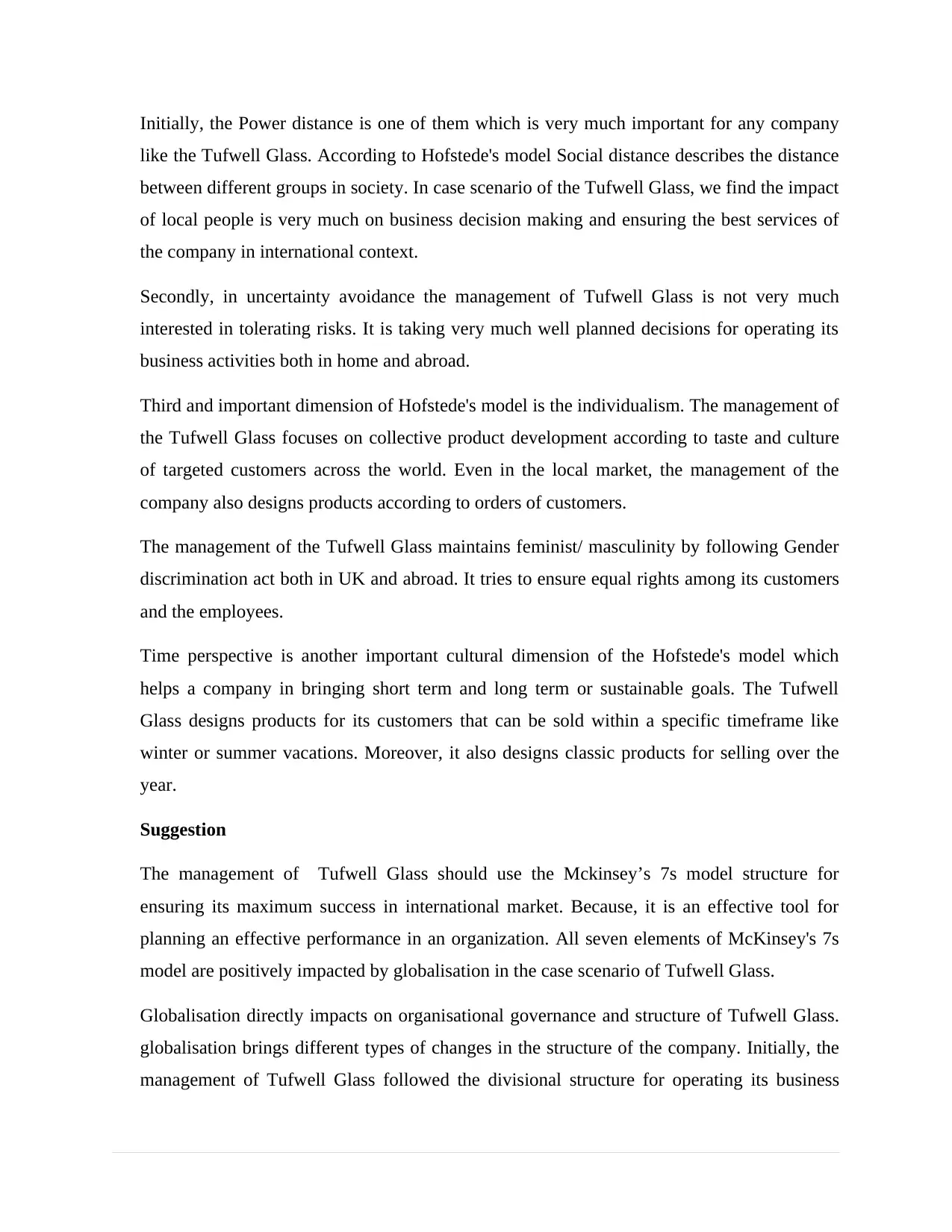
Initially, the Power distance is one of them which is very much important for any company
like the Tufwell Glass. According to Hofstede's model Social distance describes the distance
between different groups in society. In case scenario of the Tufwell Glass, we find the impact
of local people is very much on business decision making and ensuring the best services of
the company in international context.
Secondly, in uncertainty avoidance the management of Tufwell Glass is not very much
interested in tolerating risks. It is taking very much well planned decisions for operating its
business activities both in home and abroad.
Third and important dimension of Hofstede's model is the individualism. The management of
the Tufwell Glass focuses on collective product development according to taste and culture
of targeted customers across the world. Even in the local market, the management of the
company also designs products according to orders of customers.
The management of the Tufwell Glass maintains feminist/ masculinity by following Gender
discrimination act both in UK and abroad. It tries to ensure equal rights among its customers
and the employees.
Time perspective is another important cultural dimension of the Hofstede's model which
helps a company in bringing short term and long term or sustainable goals. The Tufwell
Glass designs products for its customers that can be sold within a specific timeframe like
winter or summer vacations. Moreover, it also designs classic products for selling over the
year.
Suggestion
The management of Tufwell Glass should use the Mckinsey’s 7s model structure for
ensuring its maximum success in international market. Because, it is an effective tool for
planning an effective performance in an organization. All seven elements of McKinsey's 7s
model are positively impacted by globalisation in the case scenario of Tufwell Glass.
Globalisation directly impacts on organisational governance and structure of Tufwell Glass.
globalisation brings different types of changes in the structure of the company. Initially, the
management of Tufwell Glass followed the divisional structure for operating its business
like the Tufwell Glass. According to Hofstede's model Social distance describes the distance
between different groups in society. In case scenario of the Tufwell Glass, we find the impact
of local people is very much on business decision making and ensuring the best services of
the company in international context.
Secondly, in uncertainty avoidance the management of Tufwell Glass is not very much
interested in tolerating risks. It is taking very much well planned decisions for operating its
business activities both in home and abroad.
Third and important dimension of Hofstede's model is the individualism. The management of
the Tufwell Glass focuses on collective product development according to taste and culture
of targeted customers across the world. Even in the local market, the management of the
company also designs products according to orders of customers.
The management of the Tufwell Glass maintains feminist/ masculinity by following Gender
discrimination act both in UK and abroad. It tries to ensure equal rights among its customers
and the employees.
Time perspective is another important cultural dimension of the Hofstede's model which
helps a company in bringing short term and long term or sustainable goals. The Tufwell
Glass designs products for its customers that can be sold within a specific timeframe like
winter or summer vacations. Moreover, it also designs classic products for selling over the
year.
Suggestion
The management of Tufwell Glass should use the Mckinsey’s 7s model structure for
ensuring its maximum success in international market. Because, it is an effective tool for
planning an effective performance in an organization. All seven elements of McKinsey's 7s
model are positively impacted by globalisation in the case scenario of Tufwell Glass.
Globalisation directly impacts on organisational governance and structure of Tufwell Glass.
globalisation brings different types of changes in the structure of the company. Initially, the
management of Tufwell Glass followed the divisional structure for operating its business
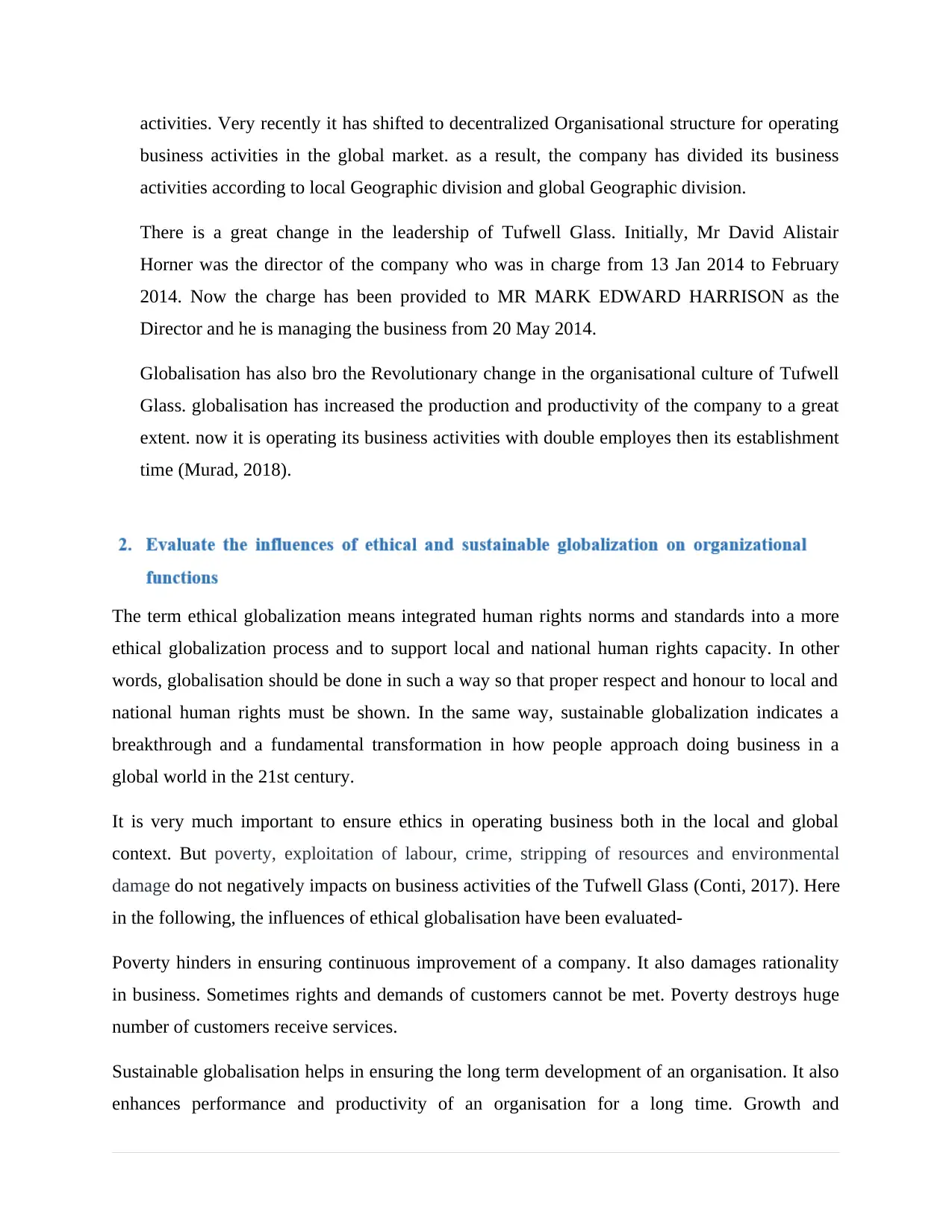
activities. Very recently it has shifted to decentralized Organisational structure for operating
business activities in the global market. as a result, the company has divided its business
activities according to local Geographic division and global Geographic division.
There is a great change in the leadership of Tufwell Glass. Initially, Mr David Alistair
Horner was the director of the company who was in charge from 13 Jan 2014 to February
2014. Now the charge has been provided to MR MARK EDWARD HARRISON as the
Director and he is managing the business from 20 May 2014.
Globalisation has also bro the Revolutionary change in the organisational culture of Tufwell
Glass. globalisation has increased the production and productivity of the company to a great
extent. now it is operating its business activities with double employes then its establishment
time (Murad, 2018).
The term ethical globalization means integrated human rights norms and standards into a more
ethical globalization process and to support local and national human rights capacity. In other
words, globalisation should be done in such a way so that proper respect and honour to local and
national human rights must be shown. In the same way, sustainable globalization indicates a
breakthrough and a fundamental transformation in how people approach doing business in a
global world in the 21st century.
It is very much important to ensure ethics in operating business both in the local and global
context. But poverty, exploitation of labour, crime, stripping of resources and environmental
damage do not negatively impacts on business activities of the Tufwell Glass (Conti, 2017). Here
in the following, the influences of ethical globalisation have been evaluated-
Poverty hinders in ensuring continuous improvement of a company. It also damages rationality
in business. Sometimes rights and demands of customers cannot be met. Poverty destroys huge
number of customers receive services.
Sustainable globalisation helps in ensuring the long term development of an organisation. It also
enhances performance and productivity of an organisation for a long time. Growth and
business activities in the global market. as a result, the company has divided its business
activities according to local Geographic division and global Geographic division.
There is a great change in the leadership of Tufwell Glass. Initially, Mr David Alistair
Horner was the director of the company who was in charge from 13 Jan 2014 to February
2014. Now the charge has been provided to MR MARK EDWARD HARRISON as the
Director and he is managing the business from 20 May 2014.
Globalisation has also bro the Revolutionary change in the organisational culture of Tufwell
Glass. globalisation has increased the production and productivity of the company to a great
extent. now it is operating its business activities with double employes then its establishment
time (Murad, 2018).
The term ethical globalization means integrated human rights norms and standards into a more
ethical globalization process and to support local and national human rights capacity. In other
words, globalisation should be done in such a way so that proper respect and honour to local and
national human rights must be shown. In the same way, sustainable globalization indicates a
breakthrough and a fundamental transformation in how people approach doing business in a
global world in the 21st century.
It is very much important to ensure ethics in operating business both in the local and global
context. But poverty, exploitation of labour, crime, stripping of resources and environmental
damage do not negatively impacts on business activities of the Tufwell Glass (Conti, 2017). Here
in the following, the influences of ethical globalisation have been evaluated-
Poverty hinders in ensuring continuous improvement of a company. It also damages rationality
in business. Sometimes rights and demands of customers cannot be met. Poverty destroys huge
number of customers receive services.
Sustainable globalisation helps in ensuring the long term development of an organisation. It also
enhances performance and productivity of an organisation for a long time. Growth and
⊘ This is a preview!⊘
Do you want full access?
Subscribe today to unlock all pages.

Trusted by 1+ million students worldwide
1 out of 17
Related Documents
Your All-in-One AI-Powered Toolkit for Academic Success.
+13062052269
info@desklib.com
Available 24*7 on WhatsApp / Email
![[object Object]](/_next/static/media/star-bottom.7253800d.svg)
Unlock your academic potential
Copyright © 2020–2026 A2Z Services. All Rights Reserved. Developed and managed by ZUCOL.





